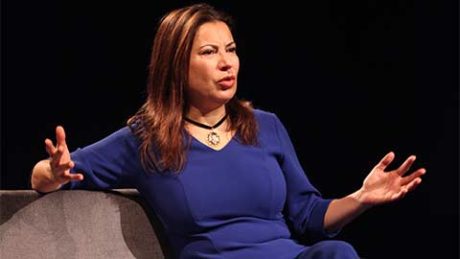Sometimes a story is so unique it needs no explanation.
Sometimes a story dares you to disbelieve.
Sometimes a story…

Where Can I Find Someone Like You, Ali? is such a story. And as written and performed by Raeda Taha, it is a story that will linger long after the lights have come back on.
We in America rarely have the opportunity to hear Palestinian voices. Not since the death of Yitshak Rabin in 1995, when an assassin’s bullet ended his life and the last, nearest chance for peace in the Middle East, have perspectives from Palestinians been presented with any regularity to the American public.
So last year, when I had the opportunity to witness Gassan Abbas perform Izzeldin Abuelaish’s I Shall Not Hate at Mosaic Theater, I took it. Autobiographic and vividly written and performed, I Shall Not Hate details the struggles of one of the most deserving of Palestinians to live and work under Israeli occupation.
Raeda Taha’s Where Can I Find Someone Like You, Ali? takes a different approach, an approach rife with challenges both emotional and intellectual.
Also autobiographic and vividly written and performed, Ms. Taha’s tale is about her relationship with her late father, a man whom most in the US media and government would consider a terrorist.
Not just any terrorist, however; her father, Ali Taha, was a member of the famed Black September organization, known primarily for the kidnapping of Israeli athletes during the 1972 Olympics.
Several months prior to that attack, Ali Taha and three other members of Black September hijacked a Belgian airline and demanded the release of hundreds of jailed Palestinians.
The Israeli special forces unit, Sayeret Matkal, eventually freed the passengers and killed Ali Taha, making Raeda Taha the Daughter of a Martyr.
Where Can I Find Someone Like You, Ali? chronicles that daughter’s 40-year-plus struggle to come to terms with her father’s absence, to find some small part of him in some other man, some other leader.
Finally, in his absence she only succeeds in humanizing him, not just for herself, but for a western world that sees him as nothing but a terrorist.
A host of interesting characters fill Ms. Taha’s tale, from the famous–“the old man” himself, Yasser Arafat (yes, “the old man” was apparently his nickname during the years Ms. Taha worked with him) to none other that Henry Kissinger (I’ll leave you to choose the nickname that best suits your inclination)–to the not so famous but nonetheless fascinating individuals who filled, or attempted to fill, Raeda Taha’s life.
Ms. Taha gives each a subtle touch, adding a wide stance to the leering uncle, a determined glare to Ali’s fierce sister who eventually recovered his body from Israeli officials, and a girlish giggle to one of her own younger siblings.
Director Lina Abyad has added her own perspective, a view which lends Ms. Taha’s simple if deeply troubling personal account of loss and love, a theatrical edge. Using a series of blackouts and selected, slightly abstracted videos, she has punctuated certain aspects of the story, most notably images of Ms. Taha’s mother and her attempt to come to terms with her celebrity status (as the Widow of a Martyr she and her children gained special privileges [much like the parents and children of our own Fallen Warriors]).
With its unique perspective Where Can I Find Someone Like You, Ali? offers Washington audiences a rare opportunity: to understand a world not just distant from their own, but considered by many to be hostile.
As the body of Ali lay frozen in an Israeli morgue years later, never to be buried, I couldn’t help think of the Greek Antigone. After both her brothers died in Thebes’ civil war, Creon buried with honors the fallen Eteocles but refused even a funeral for Polyneices, who had sided with the rebels. Though torn by grief, Antigone had risked everything to bury her brother.
Ms. Taha’s story offers no easy perspective, no simple summary of how each audience member should react.
Her tale simply is told, the way a daughter might tell the story of her father.
And that is, in the end, her greatest achievement.
Running Time: 75 minutes with no intermission.
Where Can I Find Someone Like You, Ali? plays through Friday, March 24, 2017 at The Kennedy Center—2700 F St NW, in Washington, DC. For tickets, call (202) 467-4600, or purchase them online.




